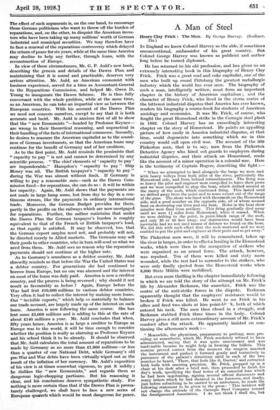A Man of Steel IN England we know Colonel Harvey
as the able, if sometimes unconventional, ambassador of his great country. But Colonel George Harvey was known as publicist and author long before he turned diplomat.
He has returned to his old profession, and has given us an extremely interesting book in this biography of Henry Clay Frick. Frick was a great coal and coke capitalist, one of the men who built up round Pittsburg the greatest metallurgic industry which the world has ever seen. The biography of such a man, intelligently written, must form an important chapter in the history of American capitalism ; and the character of Henry Frick, who lived in the storm centre of the bitterest industrial disputes that America has ever known, renders his biography a source-book for students of American sociology and economics. It was Mr. Frick, of course, who fought the great Homestead strike in the Carnegie steel plant in 1892. Colonel Harvey has an exceedingly interesting
chapter on the story of Homestead. He paints an appalling picture of how easily in America industrial disputes, at that
time, could degenerate into something which we in this country would call open civil war. The account of the 800 Pinkerton men, that is to say, men from the Pinkerton Detective Agency who hired out guards to employers during industrial disputes, and their attack on Homestead, reads like the account of a minor operation in a colonial war. Here is the testimony of Captain Rogers, describing the fight
When we attempted to land alongside the barge we were met with heavy volleys from both sides of the river, particularly the Homestead side, and from behind intrenchments. The firing was so heavy the pilot and engineer were compelled to leave their posts and we were compelled to stop the boat, which drifted around at the, mercy of the mob, which continued firing. This lasted until we drifted away from the point and to some extent out of the range of the guns. The shore was lined with thousands on the Homestead side, and a good number on the opposite side, all of whom seemed bent on destroying our lives and our boat. Holes in the boat show missiles were fired from artillery. This firing gradually died away until we were 1+ miles from Homestead, when it ceased. When we were drifting to the point, in point-blank range of the mob, and only 30 or 40 feet away, our destruction would have been inevitable had we not used means of defence we found on the boat. We did this with such effect that the mob scattered and we were enabled to put the pilot and engineer at their posts and so get away."
The Pinkerton men were, it will be remembered, taken up the river in barges, in order to effect a landing in the Homestead works, which were then in the occupation of strikers who were organized as an armed force. The attack, however, was repulsed. Ten of them were killed and sixty more wounded, while the rest had to surrender to the strikers, who were only finally ejected from the Homestead works when 8,000 State Militia were mobilized.
But even more thrilling is the chapter immediately following in which we are told the story of the attempt on Mr. Frick's life by Alexander Berkman, the anarchist. Frick was the centre of the anti-strike forces in the dispute. Berkman apparently thought that the employers' resistance would be broken if Frick was killed. He went to see Frick in his office and fired two shots at him point-b/^- k, both of which entered his neck. The men then closed in a struggle, and Berkman stabbed Frick three times in the body. Colonel Harvey gives a still more extraordinary account of Mr. Frick's conduct after the attack. He apparently insisted on con- tinuing the afternoon's work :- " Meanwhile, the physicians, preparatory to probing, were pro- viding an anaesthetic, which Mr. Frick resolutely refused to have administered, saying that it was quite unnecessary and was inadvisable because he might help in locating the bullets. This surmise proved correct from the moment the surgeon inserted the instrument and pushed it forward gently and tentatively in pursuance of the patient's directions until in each of the two searches he heard, There, that feels like it, Doctor,' and extracted both balls with unerring precision. Mr. Frick, pro ped up in a chair at his desk after a brief rest, then p to finish his day's work, specifying the final terms of an essential loan which he had been negotiating, signing several official documents and many letters which he had dotted in the forenoon, and finally, just before submitting to be carried to an ambulance, ho made the following statement to be given to the press : ' This incident will not change the attitude of the Carnegie Steel Company toward the Amalgamated Association. I do not think I Shall die, but
whether I do or not the Company will pursue the same policy and it will win."
This was indeed a man of steel.
After this Colonel Harvey's chapters on Mr. Frick's complicated negotiations with Mr. Andrew Carnegie seem a little tame ; yet, as a matter of fact, these chapters, which tell the story of Frick's disputes with Carnegie, the amalga- mations and dissolutions of their companies, and the final birth of the giant United States Steel Corporation, which has ever since dominated the American industrial scene, are of great importance.







































 Previous page
Previous page